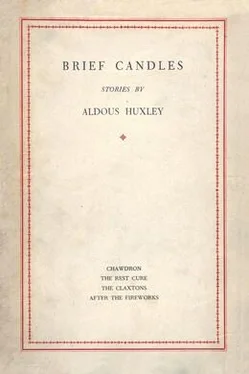‘But the falseness you spoke of, the lying, the hypocrisy?’
‘Mere inefficiency,’ Tilney answered. ‘Just bad acting. For, when all’s said and done, what is hypocrisy but bad acting? It differs from saintliness as a performance by Lucien Guitry differed from a performance by his son. One’s artistically good and the other isn’t.’
I laughed. ‘You forget I’m a moralist; at least, you said I was. These aesthetic heresies…’
‘Not heresies; just obvious statements of the facts. For what is the practice of morality? It’s just pretending to be somebody that by nature you aren’t. It’s acting the part of a saint, or a hero, or a respectable citizen. What’s the highest ethical ideal in Christianity? It’s expressed in A Kempis’s formula—“The Imitation of Christ”. So that the organized Churches turn out to be nothing but vast and elaborate Academies of Dramatic Art. And every school’s a school of acting. Every family’s a family of Crummleses. Every human being is brought up as a mummer. All education, aside from merely intellectual education, is just a series of rehearsals for the part of Jesus or Podsnap or Alexander the Great, or whoever the local favourite may be. A virtuous man is one who’s learned his part thoroughly and acts it competently and convincingly. The saint and the hero are great actors; they’re Kembles and Siddonses—people with a genius for representing heroic characters not their own; or people with the luck to be born so like the heroic ideal that they can just step straight into the part without rehearsal. The wicked are those who either can’t or won’t learn to act. Imagine a scene–shifter, slightly drunk, dressed in his overalls and smoking a pipe; he comes reeling on to the stage in the middle of the trial scene in the Merchant of Venice , shouts down Portia, gives Antonio a kick in the stern, knocks over a few Magnificos and pulls off Shylock’s false beard. That’s a criminal. As for a hypocrite—he’s either a criminal interrupter disguised, temporarily and for his own purposes, as an actor (that’s Tartuffe); or else (and I think this is the commoner type) he’s just a bad actor. By nature, like all the rest of us, he’s a criminal interrupter; but he accepts the teaching of the local Academies of Dramatic Art and admits that man’s highest duty is to act star parts to applauding houses. But he is wholly without talent. When he’s thinking of his noble part, he mouths and rants and gesticulates, till you feel really ashamed as you watch him—ashamed for yourself, for him, for the human species. “Methinks the lady, or gentleman, doth protest too much,” is what you say. And these protestations seem even more excessive when, a few moments later, you observe that the protester has forgotten altogether that he’s playing a part and is behaving like the interrupting criminal that it’s his nature to be. But he himself is so little the mummer, so utterly without a talent for convincing representation, that he simply doesn’t notice his own interruptions; or if he notices them, does so only slightly and with the conviction that nobody else will notice them. In other words, most hypocrites are more or less unconscious hypocrites. The Fairy, I’m sure, was one of them. She was simply not aware of being an adventuress with an eye on Chawdron’s millions. What she was conscious of was her role—the role of St Catherine of Siena. She believed in her acting; she was ambitious to be a high–class West–End artiste. But, unfortunately, she was without talent. She played her part so unnaturally, with such grotesque exaggerations, that a normally sensitive person could only shudder at the shameful spectacle. It was a performance that only the spiritually deaf and blind could be convinced by. And, thanks to his preoccupations with New Guinea Oil, Chawdron was spiritually deaf and blind. His deep religious sense was the deep religious sense of a sub–man. When she paraded the canonized kitten, I felt sea–sick; but Chawdron thought she had the most be–yütiful character he’d ever met with in a human being. And not only did he think she had the most beautiful character; he also, which was almost funnier, thought she had the finest mind. It was her metaphysical conversation that impressed him. She’d read a few snippets from Spinoza and Plato and some little book on the Christian mystics and a fair amount of that flabby theosophical literature that’s so popular in Garden Suburbs and among retired colonels and ladies of a certain age; so she could talk about the cosmos very profoundly. And, by God, she was profound! I used to lose my temper sometimes, it was such drivel, so dreadfully illiterate. But Chawdron listened reverently, fairly goggling with rapture and faith and admiration. He believed every word. When you’re totally uneducated and have amassed an enormous fortune by legal swindling, you can afford to believe in the illusoriness of matter, the non–existence of evil, the oneness of all diversity and the spirituality of everything. All his life he’d kept up his childhood’s Presbyterianism—most piously. And now he grafted the Fairy’s rigmarole on to the Catechism, or whatever it is that Presbyterians learn in infancy. He didn’t see that there was any contradiction between the two metaphysics, just as he’d never seen that there was any incongruity in his being both a good Presbyterian and a consummate swindler. He had acted the Presbyterian part only on Sundays and when he was ill, never in business hours. Religion had never been permitted to invade the sanctities of private life. But with the advance of middle age his mind grew flabbier; the effects of a misspent life began to make themselves felt. And at the same time his retirement from business removed almost all the external distractions. His deep religious sense had more chance to express itself. He could wallow in sentimentality and silliness undisturbed. The Fairy made her providential appearance and showed him which were the softest emotional and intellectual muck–heaps to wallow on. He was grateful—loyally, but a little ludicrously. I shall never forget, for example, the time he talked about the Fairy’s genius. We’d been dining at his house, he and I and the Fairy. A terrible dinner, with the Fairy, as a mixture between St Catherine of Siena and Mahatma Gandhi, explaining why she was a vegetarian and an ascetic. She had that awful genteel middle–class food complex which makes table manners at Lyons’ Corner Houses so appallingly good—that haunting fear of being low or vulgar which causes people to eat as though they weren’t eating. They never take a large mouthful, and only masticate with their front teeth, like rabbits. And they never touch anything with their fingers. I’ve actually seen a woman eating cherries with a knife and fork at one of those places. Most extraordinary and most repulsive. Well, the Fairy had that complex—it’s a matter of class—but it was rationalized, with her, in terms of ahimsa and ascetic Christianity. Well, she’d been chattering the whole evening about the spirit of love and its incompatibility with a meat diet, and the necessity of mortifying the body for the sake of the soul, and about Buddha and St Francis and mystical ecstasies and, above all, herself. Drove me almost crazy with irritation, not to mention the fact that she really began putting me off my food with her rhapsodies of pious horror and disgust. I was thankful when at last she left us in peace to our brandy and cigars. But Chawdron leaned across the table towards me, spiritually beaming from every inch of that forger’s face of his. “Isn’t she wonderful?” he said. “Isn’t she simply wonderful ?” “Wonderful,” I agreed. And then, very solemnly, wagging his finger at me, “I’ve known three great intellects in my time,” he said, “three minds of genius—Lord Northcliffe, Mr John Morley, and this little girl. Those three.” And he leant back in his chair and nodded at me almost fiercely, as though challenging me to deny it.’
Читать дальше



![Олдос Хаксли - О дивный новый мир [Прекрасный новый мир]](/books/11834/oldos-haksli-o-divnyj-novyj-mir-prekrasnyj-novyj-thumb.webp)






